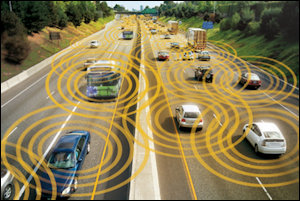 Who needs to build new roads or create tolled express lanes when the driverless car revolution is almost upon us? Clifford Winston and Quentin Karpilow suggest that autonomous cars will reduce traffic congestion by boosting highway throughput, creating a huge boost to economic productivity and output.
Who needs to build new roads or create tolled express lanes when the driverless car revolution is almost upon us? Clifford Winston and Quentin Karpilow suggest that autonomous cars will reduce traffic congestion by boosting highway throughput, creating a huge boost to economic productivity and output.
In a new paper published by the Mercatus Center, “A New Route to Increasing Economic Growth: Reducing Highway Congestion with Autonomous Vehicles,” Winston and Karpilow write:
Widespread adoption of autonomous (driverless) vehicles —- which American and foreign technology companies and automakers are actively developing, testing, and perfecting, with some industry leaders and US Secretary of Transportation Anthony Foxx expecting driverless vehicles to be available to the public by 2021 —- could reduce highway congestion by greatly improving the flow of traffic and by reducing vehicle accidents without significantly increasing the monetary cost of commuting.
Using our estimation results for California and conservatively extrapolating to the nation, we find that the adoption of autonomous vehicles could have potentially large macroeconomic stimulative effects. Specifically, in a given year, a 50 percent penetration rate for autonomous vehicles (i.e., half of the vehicles used by motorists would be driverless) could add at least $214 billion in GDP, 2.4 million jobs, and $90 billion in income to the US labor force.
Read the paper and decide for yourself if this analysis holds water. If it does, Virginia needs to jump on board the autonomous-automobile train (pardon the ironic metaphor). Early-adopter states will enjoy tremendous economic advantages over the laggards. It could be the least expensive economic boost ever.


